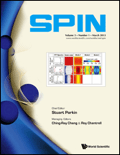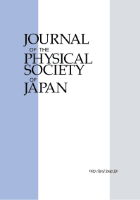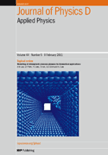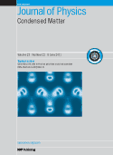
SPIN
Scope & Guideline
Exploring the frontiers of Electrical and Electronic Engineering.
Introduction
Aims and Scopes
- Spintronics and Magnetic Materials:
The journal focuses heavily on the study of spintronic materials, exploring their structural, electronic, and magnetic properties. Research often includes novel materials such as Heusler alloys and two-dimensional van der Waals materials, emphasizing their potential applications in devices. - Computational and Theoretical Models:
A significant portion of the published work utilizes advanced computational techniques, including Monte Carlo simulations and first-principles calculations, to investigate magnetic behaviors, phase transitions, and other phenomena related to spin systems. - Quantum Computing and Information Technology:
The journal also explores the intersection of spintronics with quantum computing, investigating quantum information processing, quantum circuits, and algorithms that leverage spin-based systems for improved performance. - Nanostructures and Device Fabrication:
Research includes the fabrication and characterization of nanoscale devices such as magnetic tunnel junctions and spintronic memory, highlighting innovative techniques like focused ion beam nanomachining. - Interdisciplinary Approaches:
'SPIN' encourages interdisciplinary studies that bridge physics, materials science, and engineering, promoting collaborative research that addresses complex challenges in spin-based technologies.
Trending and Emerging
- Spin-Orbit Coupling and Spin Transport:
Recent publications indicate a surge in interest in spin-orbit coupling effects and their implications for spin transport phenomena, particularly in heterostructures and topological materials, which are crucial for the development of next-generation spintronic devices. - Quantum Technologies and Information Processing:
The integration of spintronics with quantum technologies is gaining momentum, with more studies exploring spin-based quantum computing, secure communication, and quantum algorithms, marking a significant trend towards practical applications of theoretical advancements. - Nanostructured and Hybrid Systems:
There is an increasing emphasis on the study of hybrid systems that combine different materials and functionalities, such as magnetic heterostructures and nanocomposites, which are pivotal for enhancing device performance and enabling new functionalities. - Advanced Fabrication Techniques:
The journal is witnessing a trend towards innovative fabrication methods, such as advanced lithography and ion beam techniques, that allow for the precise engineering of nanoscale structures and interfaces, which is essential for realizing complex spintronic devices. - Multifunctional Materials and Applications:
Research into multifunctional materials that exhibit combined properties, such as magneto-optical effects or thermoelectric behavior, is on the rise, reflecting the need for materials that can serve multiple roles in future technologies.
Declining or Waning
- Traditional Magnetic Materials:
Research focused on conventional magnetic materials, such as bulk ferromagnets, appears to be less prominent, as the field shifts towards more complex and novel materials that exhibit unique spin properties. - Low-Dimensional Systems:
There has been a noticeable decline in studies centered around low-dimensional magnetic systems, such as one-dimensional chains or small clusters, which may be overshadowed by the growing interest in two-dimensional materials and their heterostructures. - Basic Theoretical Models:
While foundational theoretical models remain important, there is a decreasing trend in publications solely focused on basic models without experimental or practical applications, as researchers seek to connect theory with real-world applications.
Similar Journals

JOURNAL OF EXPERIMENTAL AND THEORETICAL PHYSICS
Unveiling the Mysteries of the Physical UniverseJournal of Experimental and Theoretical Physics is a distinguished publication in the field of physics, dedicated to disseminating pioneering research and fostering intellectual discourse in both experimental and theoretical domains. Published by Pleiades Publishing Inc, this journal has established itself as a crucial platform for physicists, with a commendable Q3 categorization in the 2023 rankings within Physics and Astronomy, illustrating its impactful contributions to the discipline. The journal features a wide array of articles that delve into the intricacies of physical theory, experimental techniques, and applications, making it an invaluable resource for researchers, professionals, and students alike. Although it operates under a traditional access model, its longstanding history, dating back to 1980 and converging years through to 2023, underscores its commitment to advancing the frontiers of physics knowledge. The journal is also notable for its engagement in the scientific community, aiming to bridge the gap between theoretical predictions and experimental validations. As a part of Pleiades Publishing, it continues to uphold rigorous standards of academic excellence, inviting contributions that push the boundaries of current understanding and stimulate further exploration in the fascinating world of physics.

EUROPEAN PHYSICAL JOURNAL B
Fostering Innovation in the Heart of Physics ResearchEUROPEAN PHYSICAL JOURNAL B (ISSN: 1434-6028, E-ISSN: 1434-6036), published by Springer, is a prominent international journal based in Germany that focuses on the fields of Condensed Matter Physics and Electronic, Optical and Magnetic Materials. With a converged publication timeline from 1998 to 2024, it caters to a diverse audience that includes researchers, professionals, and students striving for the latest advancements in these vital areas of physics. The journal is recognized with a Q3 ranking in both relevant categories for 2023, showcasing its solid yet notable standing within the academic community. Although currently without an H-index, its Scopus rankings reflect a percentile performance of 41st and 39th, respectively, indicating a growing influence among its peers. The journal offers open access options, ensuring that groundbreaking research is widely accessible and contributes to the collective knowledge within the scientific domain. By aiming to publish high-quality, well-researched articles, the EUROPEAN PHYSICAL JOURNAL B plays a crucial role in disseminating innovative findings and fostering collaboration in the field of physics.

LOW TEMPERATURE PHYSICS
Exploring the Depths of Thermal PhenomenaLOW TEMPERATURE PHYSICS, published by AIP Publishing, is a premier academic journal dedicated to the exploration and dissemination of research in the field of low-temperature physics. With an ISSN of 1063-777X and an E-ISSN of 1090-6517, this journal serves as a vital resource for researchers, professionals, and students eager to delve into the intricacies of thermal phenomena at reduced temperatures. Operating under a structured peer-review process, it presents high-quality, original research articles, reviews, and brief communications, all aimed at advancing our understanding of this specialized domain. Although it does not provide open access, the journal's presence in the Q3 category of Physics and Astronomy (miscellaneous) and its ranking within the 27th percentile reflect its commitment to impactful, cutting-edge research. With a publication timeline spanning from 1997 to 2024, LOW TEMPERATURE PHYSICS remains an essential platform for sharing innovative findings and fostering collaboration among physicists worldwide.

Computational Condensed Matter
Connecting Ideas and Advancements in Condensed Matter PhysicsComputational Condensed Matter, a reputable journal published by Elsevier, serves as a critical platform for advancing the understanding of condensed matter physics and related fields. Since its inception in 2014, the journal has become a pivotal resource for researchers and professionals dedicated to exploring electronic, optical, and magnetic materials, as well as materials chemistry and general materials science. With its current standing in the Q3 quartile across multiple categories in 2023, it ranks within the 60th percentile for Materials Science (miscellaneous) and the 54th percentile for Condensed Matter Physics in Scopus, reflecting its growing influence and relevance in the scientific community. The journal aims to publish high-quality, peer-reviewed articles that can foster innovation and collaboration in computational methods applied to condensed matter systems. Researchers interested in cutting-edge insights and methodologies will find Computational Condensed Matter to be an invaluable addition to their academic resources. For those seeking to contribute to or stay informed about the latest advancements in the field, this journal is a must-read.

Physical Review Applied
Elevating Applied Physics to New HeightsPhysical Review Applied is a prestigious journal published by the American Physical Society that serves as a vital platform for researchers in the field of applied physics. With an esteemed Q1 ranking in the Physics and Astronomy category and a commendable Scopus rank of #35 out of 243, this journal represents a significant milestone in disseminating cutting-edge research. Established in 2014, it focuses on the latest advancements and applications in various realms of physics, promoting interdisciplinary collaboration and innovation. Although not an open-access journal, Physical Review Applied offers a range of access options for readers and institutions, ensuring that high-impact research remains widely available. Researchers, professionals, and students alike will find this journal an essential resource for staying at the forefront of applied physics developments.

Frontiers of Physics
Connecting Ideas, Inspiring Physics ExcellenceFrontiers of Physics, published by Higher Education Press, is a premier open-access journal dedicated to fostering innovative research and excellence within the field of physics. With an ISSN of 2095-0462 and an E-ISSN of 2095-0470, this rapidly growing journal has established itself as a valuable platform for disseminating cutting-edge findings, covering a diverse range of topics from theoretical frameworks to experimental advancements. Notably, Frontiers of Physics has achieved an impressive Q1 ranking in the 2023 Scopus Quartiles for Physics and Astronomy, securing a competitive 5th out of 81 positions in its category, reflecting a high impact factor that underscores its importance to the scientific community. Since its inception in 2011 and continuing through 2024, the journal aims to bridge the gap between academia and industry, encouraging collaboration among researchers, professionals, and students alike. Its commitment to open access ensures that high-quality research is readily accessible, thereby promoting knowledge sharing and advancement in the global physics community. Explore the potential of your research in Frontiers of Physics, where the future of physics flourishes.

Micro and Nanostructures
Transforming Ideas into Innovative MaterialsMicro and Nanostructures is a leading academic journal published by Academic Press Ltd - Elsevier Science Ltd, focusing on the cutting-edge fields of biomaterials, condensed matter physics, and electronic, optical, and magnetic materials. With an impact factor reflecting its rising status, the journal has achieved remarkable rankings within its categories, including Q2 in Condensed Matter Physics and Electronic, Optical and Magnetic Materials, and Q3 in Biomaterials, as of 2023. Spanning from 2022 to 2024, Micro and Nanostructures presents integral research that advances the understanding and application of micro- and nanostructured materials, thereby playing a crucial role for researchers, professionals, and students alike. As an open access publication, it ensures broad accessibility to groundbreaking studies that shape the future of material science. The journal's commitment to high-quality research and its strategic positioning as a premier source of knowledge in its domain make it an essential platform for the dissemination of innovative ideas and discoveries.

JOURNAL OF THE PHYSICAL SOCIETY OF JAPAN
Connecting Theory with Application in PhysicsThe JOURNAL OF THE PHYSICAL SOCIETY OF JAPAN, published by the Physical Society of Japan, has been at the forefront of advancing knowledge in the field of Physics and Astronomy since its inception in 1946. With a commendable reputation reflected in its Q2 ranking within its category for 2023, this journal serves as a vital platform for disseminating high-quality research and innovative concepts. Researchers and professionals alike can engage with cutting-edge studies and reviews that span a diverse range of topics pivotal to the physical sciences. Although the journal does not currently operate with an open access model, it maintains a robust impact on the global physics community, evidenced by its placement in the 59th percentile among a competitive pool of 243 journals. With an unwavering commitment to bridging theory and application, the JOURNAL OF THE PHYSICAL SOCIETY OF JAPAN continues to inspire and cultivate scholarly discourse and collaboration across disciplines.

JOURNAL OF PHYSICS D-APPLIED PHYSICS
Bridging Theory and Application in PhysicsJOURNAL OF PHYSICS D-APPLIED PHYSICS is a prestigious peer-reviewed journal published by IOP Publishing Ltd, dedicated to advancing the field of applied physics since its inception in 1967. With an impressive impact factor that reflects its standing in the academic community, this journal occupies Q1 and Q2 rankings across various categories including Acoustics and Ultrasonics, Condensed Matter Physics, and Electronic, Optical and Magnetic Materials, underlining its vital role in disseminating significant research findings. The journal aims to publish high-quality original research articles, reviews, and technical notes, providing a platform for professionals, researchers, and students alike to explore a broad spectrum of topics within applied physics. With a commitment to accessibility, articles are made available for readers around the globe, ensuring that groundbreaking discoveries reach a wide audience. Located in the United Kingdom, at TEMPLE CIRCUS, TEMPLE WAY, BRISTOL BS1 6BE, the journal continues to push the boundaries of knowledge in physical sciences, making it an essential resource for anyone involved in this dynamic field.

JOURNAL OF PHYSICS-CONDENSED MATTER
Illuminating the Evolving Landscape of Materials Research.JOURNAL OF PHYSICS-CONDENSED MATTER, published by IOP Publishing Ltd, stands as a premier platform for the dissemination of impactful research in the fields of condensed matter physics and materials science. Since its inception in 1989, this journal has successfully bridged the gap between fundamental and applied research, delivering cutting-edge findings pertinent to both the academic community and industry professionals. Ranking in the Q2 category for both Condensed Matter Physics and Materials Science, it holds a respectable position within the scientific community, as evidenced by its Scopus rankings. With a commitment to fostering innovative research and promoting open dialogue, the journal offers a substantial collection of articles that contribute to the evolving landscape of materials science and physics. Researchers and students are encouraged to engage with the journal’s rich content, which not only enhances their academic pursuits but also plays a crucial role in advancing technologies based on solid-state materials.